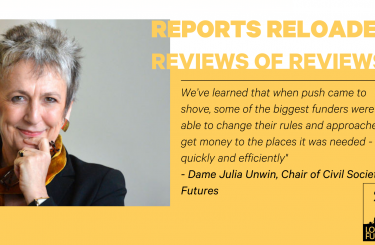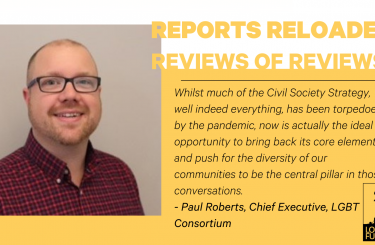Related


The Possible Not the Perfect, published in 2018, challenged funders to bring greater urgency, more open and trusting relationships and a lighter touch to our day-to-day work following funder responses to three different emergencies during the summer of 2017 (the Manchester Arena bomb on 22 May, the attacks in London Bridge and Borough Market on 3 June, and the Grenfell Tower fire on 14 June). Could the way funders responded to these dreadful events help us to work more positively and supportively with groups finding their way through the ‘everyday emergencies’ communities are dealing with?
At Tudor we were keen to build on our experience of facilitating quick grant making to groups supporting the community in the aftermath of the Grenfell Tower fire. We wanted to experiment with ‘conversational’, light-touch grant making in a different setting so in 2019 we spent time in Hartlepool, building local relationships before meeting 20 local groups in a single afternoon. A trustee and a member of staff listened to each group, and during a half-hour conversation developed a funding request with them. Later that day trustees and staff came together, reflected on the conversations, and agreed grants of up to £5,000 for each group.
At Tudor we were keen to build on our experience of facilitating quick grant making to groups supporting the community in the aftermath of the Grenfell Tower fire
The experience was really positive – both for Tudor – “we were talking beyond theory and beyond bullet points. Instead we were talking in stories” and for groups – “we really believe in our project and can get that across during a conversation rather than over two pages of a form”. We were keen to try it again and were working towards a second round in North Kent in May 2020 when Covid hit. The sense of what was ‘possible’ started to look very different.
The pandemic has pushed us to pick up the pace and just give things a go
Like many funders we immediately signed up to London Funders’ We Stand With the Sector pledge, committing to reduce pressure, offer flexibility and listen better to the groups we were funding. As we talked to our grant holders, and continued to develop new core funding applications, ideas, learning and ways of working from The Possible Not the Perfect began to flow more strongly into our grant making in the following ways:
The pandemic has pushed us to pick up the pace and just give things a go. Seeing the pressure groups on the ground were working under, and wanting to make things easier for them, led us to make some quick changes to the way we do things. What we came up with drew on previous experience, and definitely isn’t perfect, but we’ve started to make the path by walking it.

